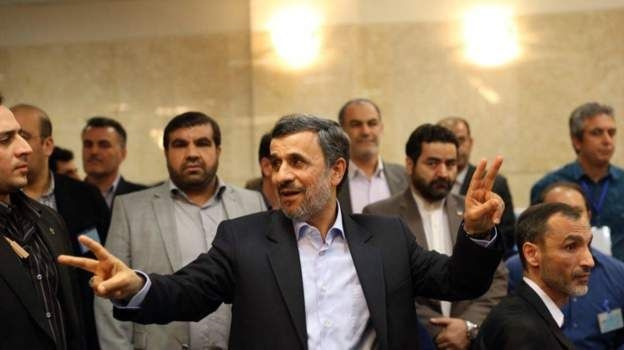Ahmadinejad’s disqualification; good news or bad news?

(Photo: Mahmoud Ahmadinejad registering as candidate in this year's presidential election.)
Mahmoud Ahmadinejad, Iran’s ex-president who had run in a bid to regain presidency, was handed disqualification by the Guardian Council on Thursday evening.
Ahmadinejad had signaled his registration was a push to boost chances for his former aide Hamid Baqaei to be allowed to run. However, the Guardian Council refused to qualify him, either. In his recently resumed series of press conferences and interviews, Ahmadinejad had confidently stated that there was no reason the Guardian Council would disqualify him or Baqaei, and that he would be using his own, undeclared, methods to undo a disqualification. However, the reactions coming from media outlets affiliated with Baqaei and Ahmadinejad showed the disqualification had received royal assent in the Ahmadinejadite house. Ahmadinejad’s media advisor Ali-Akbar Javanfekr immediately issued a statement, in which he said the Guardian Council had relieved Ahmadinejad and Baqaei of the burden of duty. Soon after the news made the rounds, tens of people gathered in front of Ahmadinejad’s house in Narmak, east Tehran, to show their disapproval. Anti-riot police were reportedly deployed.
The news has sparked reactions on both sides of the political spectrum in Iran. Many Principlists hailed the Guardian Council’s move as an intelligent decision, while Reformists said they wished he was disqualified by popular vote.
Etemad newspaper’s Mahshid Sotoudeh argued in an article published here on Saturday that the Principlist camp’s systematic efforts to put their former ally behind in oblivion has been foiled by Ahmadinejad’s elaborate plan to attract supporters, not from the two mainstream camps, but from among a community fascinated by his norm-breaking behavior. The deadly blackout in Principlist media outlets, who continue to ravage the Rouhani administration while ignoring Ahmadinejad’s disqualification, indicated that the Principlists are celebrating the suicidal end of a nightmare, the article reasoned. Ahmadinejad’s silence in response is pregnant with yet another part of his plot, anticipated Sotudeh. An Etemad daily op-ed penned by influential Reformist Abbas Abdi also called for elucidation on the unanimous disqualifying vote, because it would otherwise fail to equip the society to an ‘insight’ they need in future political decision-makings. Recounting instances in which Ahmadinejad hesitated to comply with the Supreme Leader’s demands and the lawsuits currently underway with accusations against the former president of economic corruption, Abdi questioned the Guardian Council’s vote on the grounds that it lacked a clear political or judicial rationale and indicated negligence on the part of the parliament and the Judiciary, at the time of Ahmadinejad’s presidency. According to Abdi, it is on the previous parliament to clarify why Ahmadinejad was not impeached and removed if he was found incompetent during his presidency. On the other hand, if his disqualification is based on accusations of economic corruption, the Judiciary should provide reasons why it has failed to put him on trial, Abdi argued.
Abdi did not take into consideration what many observers find as the likeliest reason Ahmadinejad has been disqualified for: his failure, again, to comply with the Supreme Leader’s recommendation that he had better not to run for office because his campaign could polarize the society. Even prior to Ahmadinejad’s disqualification, some Principlists had openly pressed the Guardian Council to bar him over his lack of belief in the fundamental principles of the Islamic Republic. Former MP Ahmad Tavakoli famously wrote a letter to the Council, saying Ahmadinejad had no adherence to velayat-e motlaqeh-ye faqih, Absolute Guardianship of the Islamic Jurist, a Shia Islam theory put to practice in Iran’s Constitution, mandating compliance with the Supreme Leader.
Abdolkarim Pahlevani wrote in an article, published on Nafte Ma website, that Ahmadinejad’s measure sum up in his efforts to gradually turn into a ‘radical inner opposition’ of the establishment. “He wanted to present himself as an alternative to the establishment and acted recklessly in the same line, which was intolerable for the establishment of course,” he argued.
In reaction to the news, many rushed to their Twitter accounts on Thursday, protesting the notion that almost everyone with a presidential portfolio in the Islamic Republic has been disqualified after he left office. Others have found it an evidence that dissident leaders of the so-called Green Movement, formed in protests to the results of Ahmadinejad’s disputed reelection, were quicker than the Guardian Council to notice the ex-president’s lack of competence. The notion is, to many, further leverage for arguments in favor of an end to the house arrest of the dissident leaders, former presidential candidates Mirhossein Mousavi and Mahdi Karroubi.

